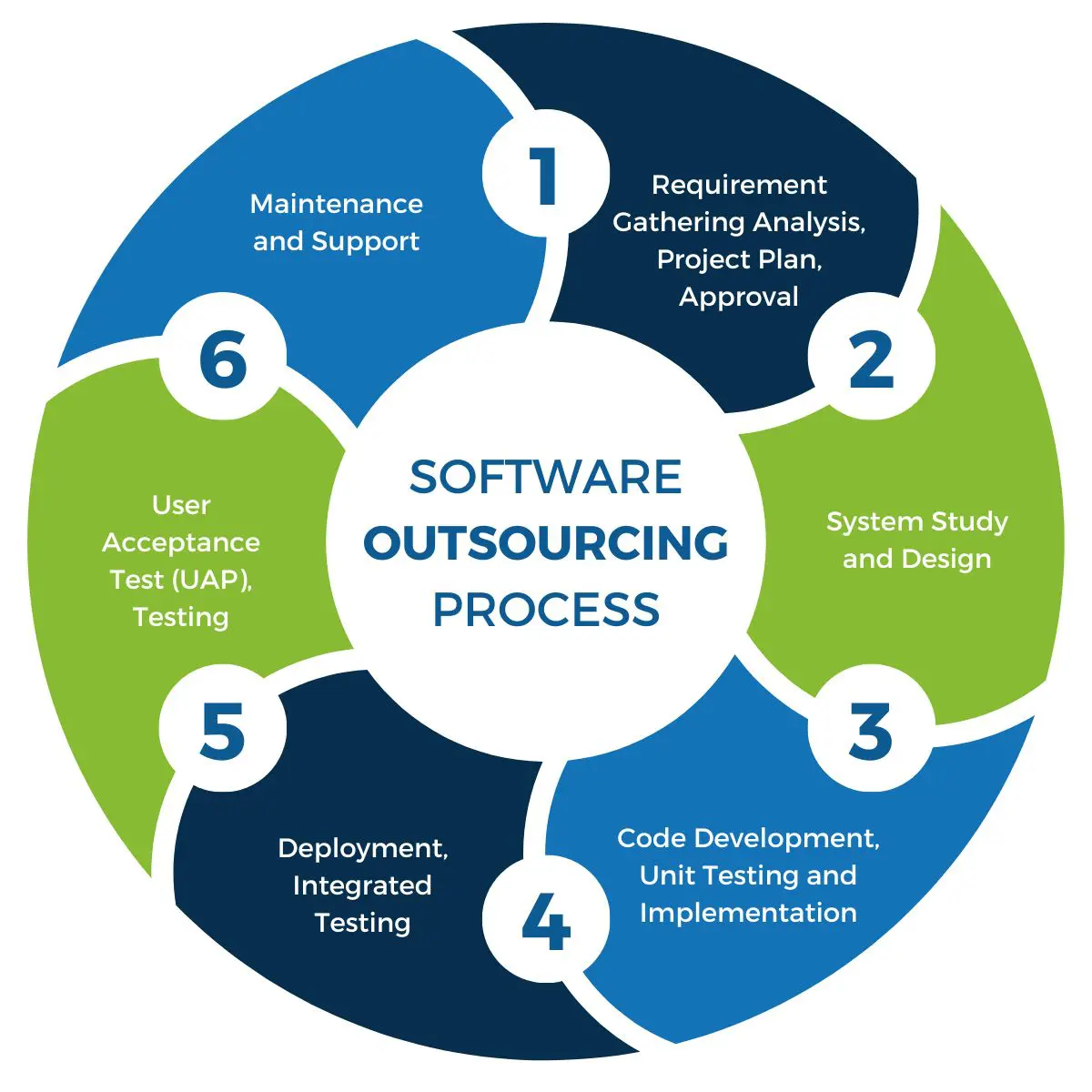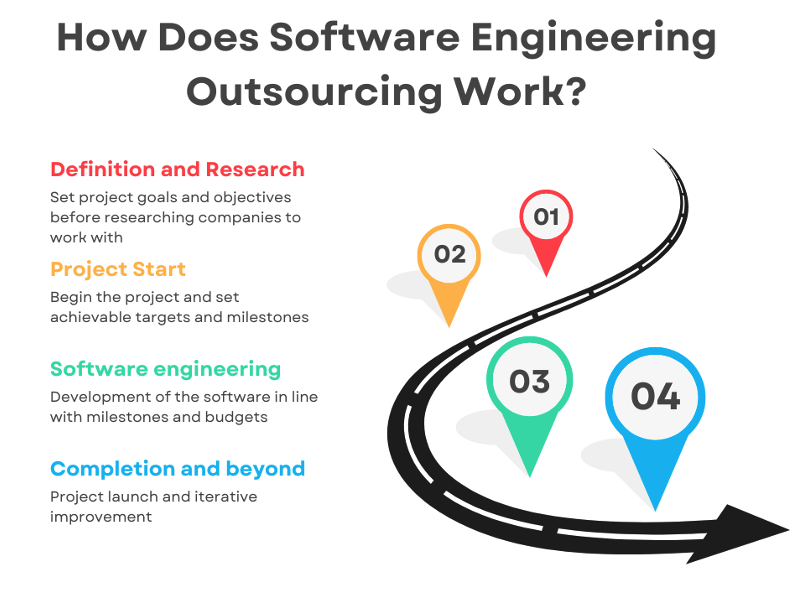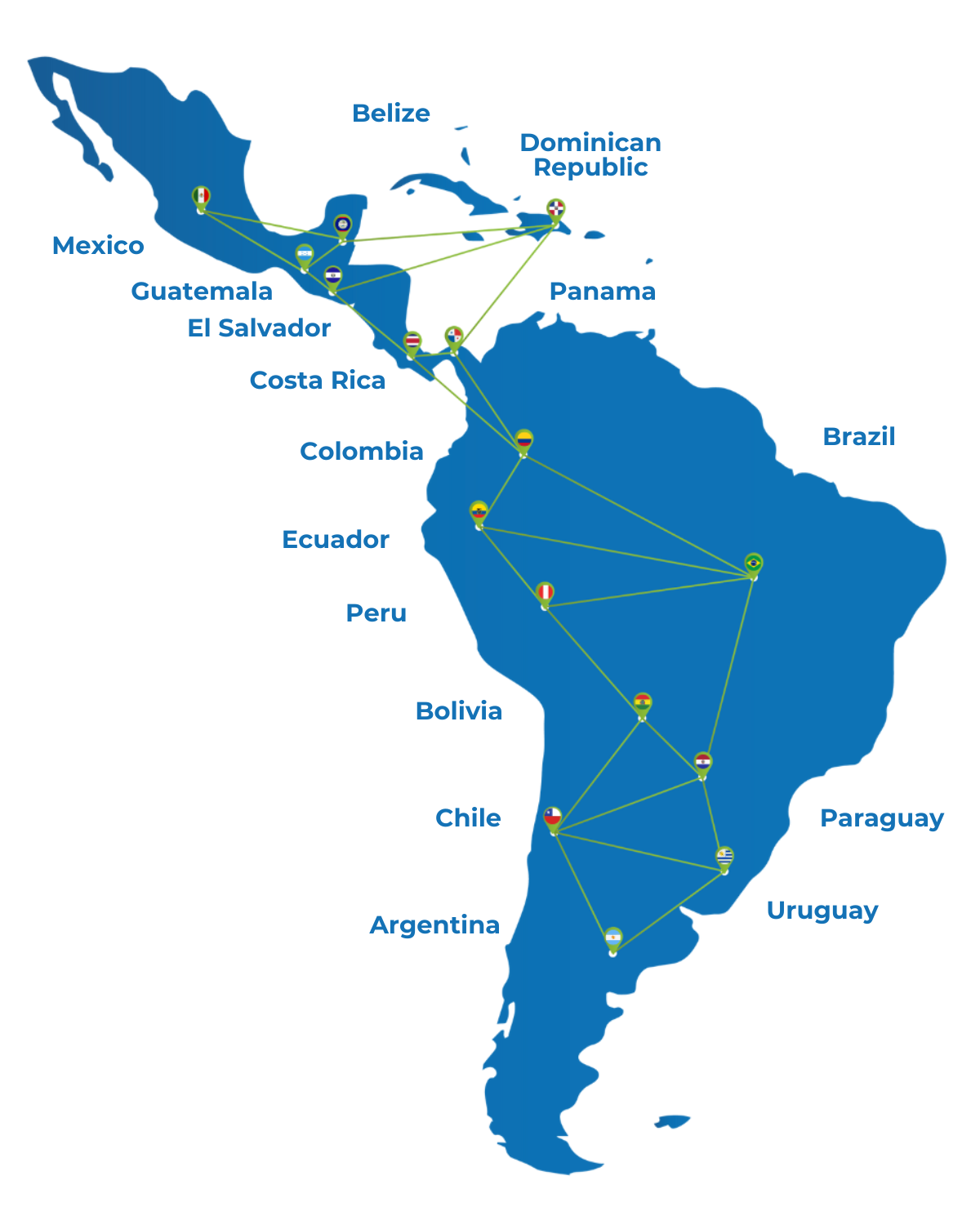In the fast-paced world of technology, software development outsourcing has emerged as a strategic step for businesses looking to stay ahead of the competition. This article aims to provide technology leaders in small and medium-sized organizations (SMBs) with a comprehensive overview of software development outsourcing, including its benefits, considerations, and practical implementation inside your organization.
What is Software Development Outsourcing?
Software development outsourcing is an organizational strategy in which a company delegates software development projects to an external company or team. The method can be used for various reasons and covers a wide range of services, from full-scale development of new software applications to specialized tasks like upgrades, maintenance, or even increasing the capabilities of a current development team.
Outsourcing can occur locally, where the third-party supplier is based in the same country or globally, with a worldwide pool of people and resources.
Key Components of Software Development Outsourcing
Outsourcing requires clearly defining the project’s scope, objectives, and deliverables. Effective management is crucial since it encompasses all stages of the software development lifecycle, from initial concept to final delivery and beyond. Project management must be structured to ensure timely and quality results, typically aided by methodologies such as Agile or Scrum.
The nature of the collaboration between the outsourcing client and the service provider may vary. Common models include:
- Project-Based Outsourcing: The client outsources individual projects with clear objectives and deliverables. This strategy is ideal for clients with specific goals and a set schedule.
- Dedicated Team: The service provider assigns a team to work solely on the client’s projects, providing high levels of collaboration and integration with the client’s in-house team.
- Staff Augmentation: This strategy allows firms to temporarily supplement their in-house development team with outsourced personnel, allowing for greater flexibility and experience as needed.
Effective communication is critical in software development outsourcing. Regular updates, meetings, and the usage of project management tools promote transparency and collaboration.
Cultural alignment between the client and the outsourcing partner can substantially impact the partnership’s success, influencing anything from communication methods to work ethic and project management practices.
Advantages of Software Development Outsourcing
Outsourcing software development has many benefits that can significantly impact your business’s efficiency, innovation, and bottom line.
Access to the Global Talent Pool.
One of the most compelling reasons to outsource is the potential to draw from a global talent pool. Geographic boundaries are no longer a barrier to finding the most talented individuals when outsourcing. You can locate specialists with particular talents to help your initiatives succeed, no matter where they are.
Focus on the core business.
Outsourcing software development enables you to focus on your key business activities rather than being distracted by complex software development duties. This allows you to focus on strategic growth projects, customer relationships, and other critical aspects of your organization.
Cost Efficiency
Outsourcing provides a significant cost savings advantage. It avoids the need for substantial initial investments in infrastructure and technology and to hire a full-time development workforce. Instead, you pay for the services you require as they arise, allowing you to make the most of your money and resources.
Faster Time to Market
In today’s competitive business landscape, speed is essential. Outsourcing software development might speed up the development process due to the outsourced team’s commitment to your project. This results in faster product introductions and the opportunity to seize market openings before competitors.
No need for micromanagement.
Outsourcing your software development relieves you of the burden of managing every aspect of the development process. Reputable outsourcing providers use project managers to guarantee that your project proceeds as planned, allowing you to concentrate on other essential elements of your organization.
Easy Scalability
Flexibility is a core feature of outsourcing. As your project requirements change, you can quickly scale your outsourced workforce up or down without the difficulties involved with hiring or firing personnel. This flexibility is essential for responding to market demands and project scope modifications.
Utilize cutting-edge technology
Outsourcing partners are frequently at the forefront of technical breakthroughs, ensuring your projects are built with the most recent technology and processes. This access might give you a competitive advantage by allowing you to implement creative solutions that align with current and future market trends.
5 Factors to Consider Before Outsourcing Software Development
Before beginning your outsourcing journey, some key aspects must be considered to ensure a smooth procedure and a positive outcome.

Identify your requirements.
The first step to successful outsourcing is clearly defining your project’s needs, objectives, and expectations. Understand your requirements regarding technological stack, project scope, and business goals. This clarity will allow you to communicate more effectively with potential outsourcing partners and find the best match for your project.
Search for a suitable provider.
Choosing the appropriate outsourcing partner is critical. Look for suppliers with a proven track record, relevant industry experience, and a portfolio showcasing their competence. Evaluate their communication skills and compatibility to ensure they fit your project and corporate culture well.
Consider the budget.
The budget plays an integral part in the decision to outsource. While cost savings are an advantage of outsourcing, assessing the quality of work and the value the outsourcing partner adds to your project is critical. Choose a balance between cost-effectiveness and quality to avoid compromising the latter.
Understand the company culture.
The cultural fit between your organization and the outsourced company might significantly impact the project’s success. Understanding and aligning with each other’s work ethic, communication style, and organizational principles can help improve collaboration and project success.
Check the security policies.
When outsourcing software development, you trust another organization with invaluable information and data. Ensure your outsourcing partner has adequate security measures and policies to secure your intellectual property and confidential information.
What IT Services Can Be Outsourced?
The number of IT services that can be outsourced is extensive and varied, catering to different technological needs and business objectives.
Custom Software Development
Service: Creating software applications specifically designed to meet the unique needs of a business.
Outsourcing Example: A retail company outsources the creation of a custom inventory management system to manage better its unique combination of products, suppliers, and sales channels than off-the-shelf software could.
QA Services & Software Testing
Service: A systematic process to ensure the software developed meets the specified requirements and is free of defects.
Outsourcing Example: A financial services organization hires an outsourcing partner to perform thorough QA testing on its new banking application, ensuring that security, functionality, and user experience match the highest standards before launch.
Cloud Computing
Service: Delivering computing services—servers, storage, databases, networking, software, analytics, and more—over the Internet (“the cloud”).
Outsourcing Example: A startup outsources cloud infrastructure development and maintenance to improve operational efficiency, scale resources on demand, and cut IT costs.
Mobile & Web Development
Service: Designing and developing websites and mobile applications accessible on various devices.
Outsourcing Example: A hospitality company hires an outsourcing firm to create a responsive website and mobile app that allows clients to make bookings, access services, and receive personalized suggestions.
IT Maintenance & Support
Service: Providing ongoing technical support and maintenance for IT systems to ensure they run smoothly and securely.
Outsourcing Example: An e-commerce platform outsources its IT maintenance and support to assure 24×7 uptime, handle system updates, and immediately assist users experiencing technical issues.
Blockchain Consulting
Service: Advising on the strategic implementation of blockchain technology to enhance transparency, security, and efficiency.
Outsourcing Example: A logistics company collaborates with a blockchain consulting firm to create a decentralized tracking system that improves supply chain transparency and integrity.
Big Data & Analytics
Service: Analyzing large data sets to uncover hidden patterns, correlations, and insights to make informed business decisions.
Outsourcing Example: A marketing agency outsources big data analytics to extract insights from customer data, allowing for the construction of tailored advertising campaigns and strategies.
IoT Solutions
Service: Developing applications and systems that enable devices to connect and exchange data with the Internet of Things.
Outsourcing Example: A manufacturing company outsources the development of an IoT solution to monitor machines in real-time, forecasting maintenance requirements before problems occur and decreasing downtime.
UI/UX Software Design
Service: Designing the interface and experience of software applications to be user-friendly and engaging.
Outsourcing Example: A healthcare app outsources UI/UX design to guarantee that its platform is accessible, easy to browse, and offers patients a seamless experience managing their health information.
MVP Development
Service: Building a minimal viable product with just enough features to satisfy early customers and provide feedback for future product development.
Outsourcing Example: A tech startup outsources MVP development for its new social networking app to rapidly test its concept in the market, receive user input, and refine it before investing in full-scale development.
These examples demonstrate how outsourcing IT services may help firms gain access to specialized talents and technologies, allowing them to develop and scale more efficiently and cost-effectively.
The Benefits of Software Outsourcing
Expanding on the initial advantages, software outsourcing offers a range of benefits that contribute to its growing popularity among businesses:
- Accessing Global knowledge: Collaborate with top professionals worldwide to provide creative solutions and expertise to your projects.
- Complementing Existing Infrastructure: Improve your current operations without substantial investments in new technology or personnel.
- Faster Turnaround: Reduce project delivery timeframes, allowing you to fulfill market expectations more efficiently.
- Cost Savings: By avoiding the expenses associated with in-house teams, development costs can be significantly reduced.
- Flexibility: You may easily alter the size of your outsourced workforce to meet project requirements and deadlines.
- Reduced Risk: Reduce project risks by relying on expert outsourcing partners who follow best practices.
- Responsibility: Outsourcing organizations typically accept complete responsibility for the project, ensuring that all objectives are met within the timeframe specified.
How Does Software Engineering Outsourcing Work?
Software engineering outsourcing is a multi-step process that ensures that the outsourcing client and the supplier work together to accomplish the required software development objectives.

Project Definition
The first step is to define the project’s scope, objectives, and specific needs. This phase entails meticulous planning, including formulating particular goals, timetables, and expected outputs. A practical project definition lays the groundwork for a successful outsourcing partnership.
Outsourcing Research
Choosing the proper outsourcing partner necessitates thorough research. Consider the provider’s technical expertise, industry experience, project management skills, and client testimonials. Furthermore, evaluating the potential partner’s communication style and cultural compatibility is critical for long-term collaboration.
Start the project.
After selecting an outsourcing partner, the project begins with an initial briefing covering the scope, timeframes, and milestones in detail. This step often involves establishing communication channels, project management tools, and reporting processes to facilitate smooth collaboration.
Software Engineering
Most of the work consists of the actual software development process, which is controlled and executed by the outsourced team. This phase consists of design, coding, testing, and iterations based on feedback. Regular updates and evaluations are required to align the project with its goals and make appropriate changes.
Project Completion and Beyond
After the development process, the project goes through final testing and quality assurance before being delivered. However, software engineering outsourcing does not always end with a project conclusion. Agreements often consist of ongoing support, maintenance, and updates to guarantee that the software stays functional and secure over time.
Best Outsourcing Locations: Latin America
Latin America has become a popular destination for software development outsourcing due to its competitive advantages, which include cost-effectiveness, skilled labor, and convenient time zones for North American clients.

Brazil
Brazil is rising as a key technological hub in South America, aided by an inventive tech sector contributing significantly to GDP. Brazil has approximately 500,000 software developers, indicating a sizable, well-educated workforce skilled in data science and technology. The country excels in data visualization and has good rankings in databases, computer programming, and mobile development.
This knowledge is supported by prestigious institutions such as the University of São Paulo and the State University of Campinas, which contribute to a thriving startup ecosystem. However, high taxes and complex laws emphasize the need to select outsourcing partners with local knowledge.
Mexico
Mexico stands out for its strong relations with the United States, reinforced by proximity and bilateral agreements, making it a suitable nearshoring option. The country’s tech scene is thriving, with Mexico City and Guadalajara serving as hubs.
With roughly 225,000 engineers, Mexico’s education system, which includes the National Autonomous University of Mexico and the Monterrey Institute of Technology, is critical to creating highly educated individuals. Mexican developers are sought after for their computer and data science proficiency, making Mexico an appealing option for US enterprises looking to outsource software development.
Chile
Chile, known as one of the most inventive economies in Latin America, provides a politically stable and business-friendly climate for outsourcing. The country’s investment in education and online government services, combined with a strong emphasis on intellectual property and software spending, add to its appealing outsourcing profile.
Chile’s universities, such as the Pontifical Catholic University of Chile and the University of Chile, play an important role in talent development, with a trained technological workforce of 61,000 developers. Chile’s outsourcing industry benefits from the country’s high human development index as well as its strong technological and data science talents.
Uruguay
Despite its modest size, Uruguay’s high-quality IT talent pool is bolstered by democratic stability, pro-innovation legislation, and a strong educational system. The country is famous for emphasizing software sector growth and promoting knowledge exchange between academics and industry, as seen by programs like Pando Science and Technology Park and Uruguay Innovation Hub.
Uruguay’s commitment to education and innovation and its hospitable business environment make it a desirable destination for software development outsourcing, particularly for businesses seeking high-caliber expertise.
Colombia
A young, tech-savvy populace and government incentives fuel Colombia’s thriving IT economy. The country is known for its strong performance in high-tech imports, intellectual property, and labor productivity. Colombia’s tech talent area, which includes Rappi, a top unicorn, stands out, particularly in operating systems, computer networking, and programming. Prestigious universities such as the University of the Andes and the National University of Colombia contribute to a well-educated workforce.
Colombia’s strategic focus on growing the software industry provides an appealing combination of skill and innovation for organizations looking to outsource software development.
How Do You Outsource a Software Development Project?
A strategic approach is necessary when outsourcing a software development project to meet your business goals and fully utilize your outsourcing partner’s capabilities. The following three actions are crucial to take:
#1 Assess Your Team’s Capabilities
It’s essential to thoroughly assess the talents and capabilities of your internal staff before outsourcing. This evaluation aids in pinpointing the precise knowledge and tasks that are either lacking or might be improved through outsourcing. Knowing your team’s strengths and weaknesses will help you identify the areas—such as specialist software development, project management, or specialized technical knowledge—where an external team may add the most benefit. By taking this step, you can be sure that the outsourcing plan will enhance your current team rather than cause gaps in collaboration or duplicate activities.
#2 Evaluate the Outsourcing Companies’ Quality
Your project’s success depends on selecting the best outsourcing partner. Start by investigating such businesses, paying particular attention to their background, experience, client references, and standing in the sector. It’s crucial to confirm the caliber of their work using case studies or references, and you should consider holding team interviews or technical evaluations to get a firsthand sense of their level of competence.
Additionally, evaluate their background in your sector or with related projects to make sure they are aware of the unique difficulties and demands you have. Along with the technical know-how you require, a top-notch outsourcing provider will also have project management and communication techniques that fit your company’s standards and culture.
#3 Implement Project Management Processes.
Effective project management is critical for a successful outsourcing collaboration. Implementing strong project management practices provides clear communication, on-time deliveries, and alignment with project objectives. This includes creating an organized framework for project tracking, reporting, and meetings.
Use project management tools and platforms that provide visibility into the project’s progress to all stakeholders. Setting explicit milestones, deliverables, timetables, and regular check-ins and updates can help keep the project on track. Identifying roles, duties, decision-making processes, and escalation channels for dealing with potential concerns is critical.
Debunking Outsourcing Myths
Outsourcing, a widely adopted practice across industries, is often surrounded by myths and misconceptions that can mislead or deter businesses from leveraging its full potential. Here, we debunk some of the most common myths about software outsourcing.
“Software Outsourcing is the same as Staff Augmentation”
Both approaches use external resources, but they serve different ends. The outsourcing partner is often responsible for the entire project management and development process when outsourcing software.
On the other hand, staff augmentation refers to temporarily increasing your in-house staff with external professionals to meet specific skill gaps. Outsourcing is more project-focused, whereas staff augmentation is resource-oriented.
“The main purpose of Software Outsourcing is to reduce costs”
Though cost savings are substantial, outsourcing serves more than one purpose. Businesses also outsource to gain access to a global talent pool, shorten time-to-market, concentrate on core business tasks, and exploit external expertise and breakthrough technologies. Cost savings are a result of these strategic advantages.
“Outsourcing increases costs”
This misconception arises from instances where hidden expenditures or bad management resulted in budget overruns. When correctly planned and implemented, outsourcing can drastically reduce operational and labor costs. Clear communication, having realistic expectations, and selecting the right outsourcing partner are critical to minimizing expenses and increasing ROI.
“You can get the same benefits from freelancers”
While freelancers can bring expertise and flexibility, working with a firm provides additional benefits such as organized project management, accountability, scalability, and a multidisciplinary team devoted to your project. Companies frequently have established systems, a broader breadth of experience, and the ability to manage larger or more complex projects than individual freelancers.
Summary
Software development outsourcing is an organizational approach that enables firms to benefit from external knowledge, reduce expenses, and focus on core operations while maintaining high-quality software development. It encompasses various services, including custom software development, QA and testing, and IT maintenance and support, all tailored to individual company requirements.
Outsourcing not only provides access to a worldwide talent pool, but it also allows for flexibility and scalability to manage projects of any size or complexity. Despite widespread misconceptions, outsourcing is distinct from staff augmentation, aiming for more than just cost savings, and can provide benefits over hiring freelancers, such as thorough project management and access to a diverse team.
Understanding these elements can assist firms in efficiently using outsourcing to achieve their software development objectives.
ParallelStaff for your Outsourcing Needs
ParallelStaff stands at the forefront of transforming how businesses approach software development outsourcing. With a focus on nearshore staffing, we specialize in connecting companies with a vast network of over 5,000 top engineers from 15 countries, ensuring a seamless match with the skills and expertise required for your projects.
Whether it’s rapidly building project capacity through staff augmentation, launching dedicated teams to complement your existing staff for significant initiatives, or completely outsourcing the development of new solutions, ParallelStaff offers flexible, cost-effective staffing solutions tailored to fit any project’s needs.
Services Offered by ParallelStaff
- Staff Augmentation: Perfect for fluctuating workloads, this service allows you to add skilled developers to your team rapidly, enhancing project capacity with ease.
- Dedicated Teams: For large-scale initiatives, launch fully-scoped teams under your leadership to work alongside your existing staff, offering a harmonious blend of external expertise and internal knowledge.
- Software Development: Outsource the development of new solutions entirely to ParallelStaff and receive regular progress reports from our expert team, ensuring transparency and consistent alignment with your project goals.
ParallelStaff is not just about filling a gap; it’s about adding value, expertise, and innovation to your projects with full-stack expertise tailored for every project need.
Ready to take your software development projects to the next level with flexible, cost-effective outsourcing solutions? Contact ParallelStaff today and discover how our tailored staffing solutions can transform your project outcomes. Approve talent quickly from our pool of top engineers and make your next project successful.






